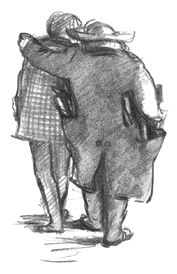Via de Boheme – how the Bohemian Club was formed

Part 20 (of 24)
The story so far … homeless artist and musician Alexandre Schaunard has been traipsing the streets of Paris, trying to borrow a few francs. He meets a philosopher, Gustave Colline and they share a meal. Later, as firm friends, they move on to another café in search of alcohol and coffee, where they meet Rodolphe. Schaunard, forgetting he is homeless, invites his new friends back to his former lodgings and is amazed to discover they are already occupied. Everyone, including the new tenant, Marcel is thoroughly confused. Now read on …
The young man in the doorway could not help laughing. “If you care to come in for a moment,” he said, “doubtless your friend, on seeing the premises, will recognise his mistake.”
“With pleasure.” The poet and philosopher took Schaunard by either arm and led him into the room, or rather palace, which now belonged to Marcel, whom the reader will no doubt have recognised. Gazing vaguely round him, Schaunard muttered: “It’s amazing! How much more beautiful my home has become!”
“Well, are you convinced now?” Colline enquired. But Schaunard has espied his piano, and was playing scales on it.
“Hi, all of you, listen to this,” he said, thumping out some chords … “High time too! The animal recognises its master: si, la, sol, fa, mi, re – re, you rascal, you’ll never improve, the devil take you! I told you this was my instrument.”
“He insists upon it,” Colline said to Rodolphe.
“He insists upon it,” Rodolphe repeated to Marcel.
“And what about that?” said Schaunard, pointing to the spangled petticoat, which was lying on a chair. “Perhaps you’ll say that yonder ornament is not mine!” He looked at Marcel down his nose. “Or that?” He removed from the wall the bailiff’s notice mentioned earlier, and began to read aloud: “M. Schaunard is accordingly under obligation to vacate the premises and to hand them over in a good state of tenant’s repairs, before midday on April the eighth. And I have brought to his notice this present writ, of which the cost is five francs.”
“Oh, oh, so now you’ll say that I’m not M. Schaunard, who’s been turned out by the bailiff – with an official stamp, too, of which the cost is five francs … And what about those?” he continued, recognising the slippers that Marcel was wearing. “Aren’t those mine – a gift from a dear one? It’s your turn, sir,” he said to Marcel, to explain your presence amongst my lares and penates.”
“Gentlemen, said Marcel, addressing himself especially to Colline and Rodolphe, “this gentleman is in his own home, I admit it.”
“Well, now,” said Schaunard, “that’s something.”
“But I am also in my own home.”
“But, sir,” said Rodolphe, “if our friend recognises …” “Yes,” said Colline, “if our friend …” “And if, for your part, you remember …” Rodolphe continued, “how does it come about that …”
“Yes,” said Colline, echo answers: “How does it come about?”
“Pray be seated, gentlemen,” said Marcel, “and I shall explain the mystery.”
“Suppose we were to celebrate the explanation with a drink?” Colline tentatively proposed.
“And with a bite to eat,” said Rodolphe.
[to be continued …]
Vie de Bohème by Henry Mürger, a vivid portrait of the ‘Bohemian’ life of the artistic quarter of Paris in the nineteenth century was originally published (by Michel Lévy) in 1851. The extract above is taken from a translation by Norman Cameron, published by Hamish Hamilton. The illustration is by Dodi Masterman.
Leave a Response
You must be logged in to post a comment.

